The Best Marketing Automation Tools for Small Businesses
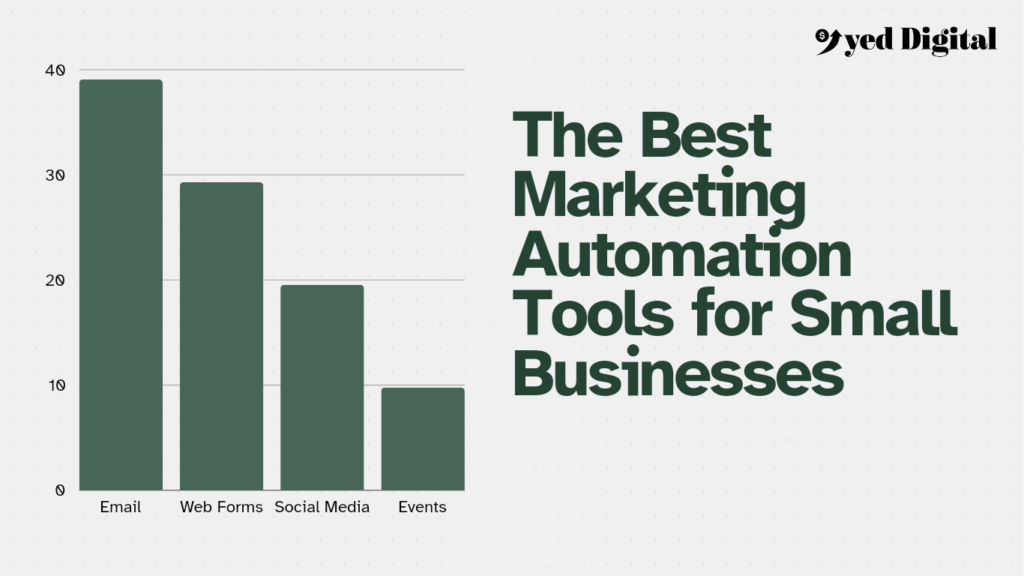
In modern business it is efficiency that matters most. For small and medium-sized enterprises (SMEs), marketing automation can be a game changer, saving time and resources as well as extending reach and impact. Nevertheless, what makes choice of marketing automation tools a challenge is a number of options currently available on the market.
In this article, we will explore the top-rated free marketing automation platforms that are suitable for SMEs, and discuss their features, functionalities and how they will transform your marketing strategies.
Whether you are trying to simplify email campaigns, nurture leads or convert website visitors to your loyal customers, we have you covered.
Importance of free marketing automation tools for small businesses
Nowadays, in the digital era small businesses are competing hard as many of them have scarce assets to their name. In this rapidly changing environment, performance and outcomes are vital.
It is at this juncture that free marketing automation software steps in as a game-changer.
Marketing automation software provides small businesses with the necessary resources to standardize and improve their marketing activities, enabling them to compete with large organizations on an equal footing. Time and resource-saving are among the most notable benefits of marketing automation for small enterprises. Tasks like email marketing, social media management, and lead nurturing, which would otherwise be time-consuming, can be done automatically using these automated, marketing software workflows, thus freeing up manpower for other significant matters of business.
Similarly, marketing automation enables small businesses to communicate with their audience in a personalized and targeted manner at a large scale. Businesses can now use data analytics and segmentation to segment their marketing messages to individual preferences and behaviors, thus increasing customer engagement and conversion rate.
Moreover, marketing automation helps to ensure uniformity and dependability in marketing campaigns. Using prearranged workflows and automated replies, companies could make sure that every single lead gets timely responses and none is lost.
Understanding Marketing Automation
Marketing automation software has become a vital tool for companies seeking to make their marketing initiatives more efficient and effective and to have better customer communication. It uses technology for automation of repetitive jobs, for management of complicated projects and for coaxing leads through the sales funnel. In this part, we will look into what marketing automation software is for and differentiate it from Customer Relationship Management (CRM).
What marketing automation software does?
Marketing automation software is designed to automate marketing processes and workflows, giving companies the ability to execute targeted campaigns, to personalize communications, and gauge performance metrics.
Lead Generation and Management:
Marketing automation systems assist in the capturing of leads via different channels like forms, landing pages and social media. Then it segments and grades the leads following their behavior and interactions with the brand.
Email Marketing Automation:
Email campaign automation is one of the main capabilities of marketing automation software. This allows businesses to send hyper-personalized emails at scale, send emails triggered by specific actions or milestones, and nurture leads with automated drip campaigns.
Campaign Management:
Marketing automation platforms enable the creation, scheduling, and tracking of multi-channel marketing campaigns. The businesses can synchronize and monitor all marketing facets from a single platform like social media postings and ad campaigns.
Lead Nurturing and Segmentation:
With the help of complex segmentation and targeting, marketing automation software, the business will be able to send different sets of audience customized content and offerings.
This does not only lead to the nurturing of the leads but also helps in guiding them through the buyer’s journey.
Analytics and Reporting:
The marketing automation tools give you the opportunity to gain important insights from the campaigns’ performance, engagement of the audiences, and ultimately ROI.
Metrics like email open rate, click-through rate, conversion, and revenue attribution will help businesses improve their marketing strategies.
Differentiating between CRM and Marketing Automation Tools
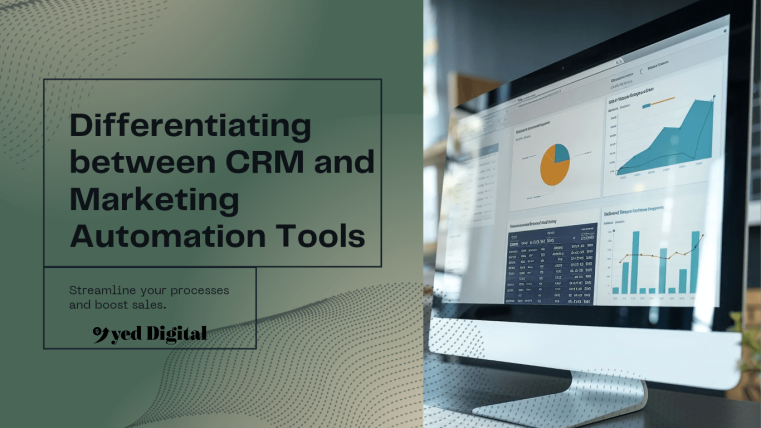
CRM and marketing automation tools have different purposes and fit different stages of the customer lifecycle when you are managing customer relations and driving sales.
CRM (Customer Relationship Management):
CRM software focuses on customer interaction and relationship management, both with the current and potential customers.
It gathers customer data in one place, monitors interactions across the different touchpoints, and enables the management of sales pipelines and customer support.
CRM systems are generally designed for maintaining relationships, keeping track of deals, and devising a total picture of the communication with customers.
Marketing Automation:
However, marketing automation software is designed for automation of marketing procedures and campaigns.
Contrary to CRM systems which target at managing customer relations, marketing automation tools aim at lead generation and nurturing, targeted campaign execution, and marketing analytics.
They work together with CRM systems to deliver information on marketing activities and ease the process of lead prospects.
Top free marketing automation tools for small business owners
In the ever-changing world of digital marketing services, small business owners face this challenge of finding budget-friendly but powerful tools to help them run their marketing campaigns smoothly.
With marketing automation platforms becoming indispensable tools, there comes efficiency, scalability, as well as focusing on a targeted engagement.
In this section, we will explore five best free marketing automation platforms that are designed for small businesses.
HubSpot:
HubSpot, a global marketing automation leader, has earned its place among the titans of the industry due to its range of products, which are tailored to attract, engage, and satisfy customers.
Hubspot is one of the best free marketing software
For small businesses, HubSpot’s free offering provides comprehensive features which include marketing automation, customer relationship and analytics. HubSpot with its drag-and-drop editors that are also customizable, and automated workflows helps businesses to automate repetitive processes, nurture leads, and drive conversions effectively and conveniently.
Mailchimp:
When mentioning email marketing excellence, MailChimp has been synonymous for a long time by working with companies of any size offering a user-friendly interface and a lot of features.
Mailchimp’s free plan for small businesses is about essential tools for creating, sending, and tracking email campaigns.
From customizable templates to audience segmentation and A/B testing, Mailchimp facilitates the entire email marketing workflow, thus helping companies to send out timely and relevant messages, and engage their audiences with ease.
Zoho Campaigns:
For small businesses trying to find an easy way to amplify marketing efforts with automation, Zoho Campaigns steps in as a dynamic solution.
Thanks to Zoho’s free plan, businesses get to engage the automation features such as email scheduling, autoresponders, and workflow automation.
Through the application of automation, organizations can simplify marketing activities, improve audience targeting, and make individualized interactions more effective, eventually increasing ad effectiveness and ROI.
Sumo:
Sumo differs from the rest in marketing automation strategy, as it is centered on turning website visitors into high quality contacts and customers.
Via its free plan, Sumo allows businesses to have a stack of tools for the lead capturing task, namely pop-ups, welcome mats, and exit-intent overlays.
Through thoughtful interactions at critical points of engagement, Sumo helps brands to develop their email list, nourish leads and boost conversions, as well as improve user satisfaction level.
Benchmark Email:
Benchmark Email beats its peers in terms of user-friendliness and the richness of its options with its free plan targeting smaller businesses.
As far as email designing and automation, list management and analytics are concerned, Benchmark Email equips businesses with the necessary tools to create exciting campaigns and to measure their outcomes precisely.
Benchmark Email’s free plan does not offer an unlimited number of subscribers and email sends but remains a great option to increase budget conscious marketing efforts.
Top free marketing automation platforms for small businesses
Marketing automation platforms provide businesses with potent tools that can ease marketing processes, increase efficiency and aid in growth.
Some platforms provide paid plans with the free-forever option (with certain features) while other platforms give free trials to test their full capacities before paying for a paid plan.
1. ActiveCampaign
ActiveCampaign is a renowned marketing automation platform which gives 14-day free trial.
All features, such as email marketing, automation, CRM, and sales automation, are available to the users during the free trial period.
This let them see whether the platform fits the bill and their marketing objectives.
2. GetResponse
GetResponse offers a 30-days free trial on its marketing automation platform for businesses to test the email marketing, automation, landing pages, and webinar features.
There is no need to pay any fee upfront as the trial allows all the features and tools that a company needs in order to create and execute quality marketing campaigns.
3. Marketo
Marketo provides a free trial of its marketing automation software; thus, the business can explore its advanced features for lead management, email marketing, and analytics.
The trial period can be customized as per business requirement, thus, allowing for a thorough exploration of the platform along with a comfort in making a decision.
4. Pardot
Pardot, a Salesforce subsidiary, makes its marketing automation platform available during a free trial in which enterprises can use the tools for segmenting leads, email marketing and sales coordination.
During this initial period, companies can enjoy 15-30 days of trial, enough time to access the platform and determine if it matches their marketing needs.
5. SharpSpring
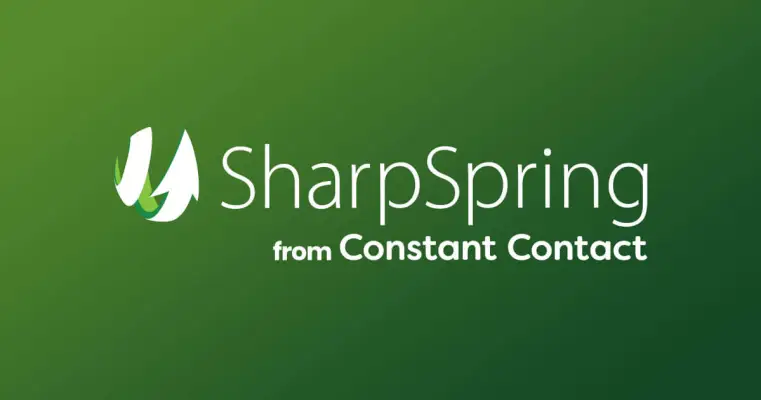
SharpSpring provides a 14-day free trial of its marketing automation platform to give businesses a chance to test all the features that make up lead nurturing, CRM integration, social media management, and analytics.
The trial period incorporates all operations and utilities thus giving the customers a chance to determine if the product is effective in enhancing marketing success.
6. Infusionsoft by Keap
This tool offers a free trial to business owners as they automate their marketing campaigns, manage customer relationships and increase sales.
A free trial period of 14 days is usually provided whereby businesses can use the platform, test its functionality, and evaluate whether it aids their marketing performance or not.
Limitations of Free Marketing Automation Tools
The marketers always lean on marketing automation tools to better organize their marketing as well as increase efficiency for small businesses.
Free marketing tools are certainly a tempting option for businesses working with limited resources, but they also come with their own problems and disadvantages that companies should keep in mind.
Limited Features and Functionality:
A free marketing automation application usually provides fundamental features and functions in contrast to the fulltime paid versions.
Businesses can see themselves in a place of constraint where their numbers of contacts, emails or campaigns are limited, which can negatively impact on the scale of their marketing activities.
Lack of Customization Options:
Create personalizing marketing approaches that suit the different tastes and preferences of your prospects.
On the other hand, free marketing automation tools usually don’t present many customization options and this is a problem for businesses that want to develop campaigns that are personalized and engaging enough for the audience.
Restricted Integrations:
In order to incorporate marketing automation with other business systems and platforms, like CRM software or e-commerce platforms, to have easy data management and workflow automation, it is a must.
If cheap marketing automation tools do not have much integration opportunities, it is difficult for enterprises to fully benefit from the technology stack they have.
Limited Support and Resources:
Small businesses might not have what it takes to utilize marketing automation in a maximum way, since they may not have the necessary resources and expertise.
While the paid platforms usually provide professional customer support and extensive resources such as tutorials, webinars and help documentation, free marketing automation tools would possibly not have the same support, leaving businesses to figure errors out on their own.
Branding and Advertisements:
Sometimes in free marketing automation tools you can see branding of the vendor or advertisements in emails or landing pages that can make business look unprofessional and untrustworthy.
This can have a negative impact on brand perception and may deter potential customers from engaging with the same business model.
Data Security and Privacy Concerns:
The security of data and customer privacy are the major considerations that businesses must make, specifically when they handle confidential customer details.
The free marketing automation tools tend not to have the same security measures and compliance standards as the paid platforms and this puts businesses at risk of data breaches or non-compliance with laws like the GDPR.
Limited Scalability:
The more businesses grow and their customer base increases, the more they need marketing automation tools that can multiply with their other needs.
The free platforms can put a limit on the number of contacts, emails, or users that can overwhelm a business when it is experiencing a growth period without upgrading to a premium plan or switching to a better platform.
Benefits of using marketing automation platforms for small businesses
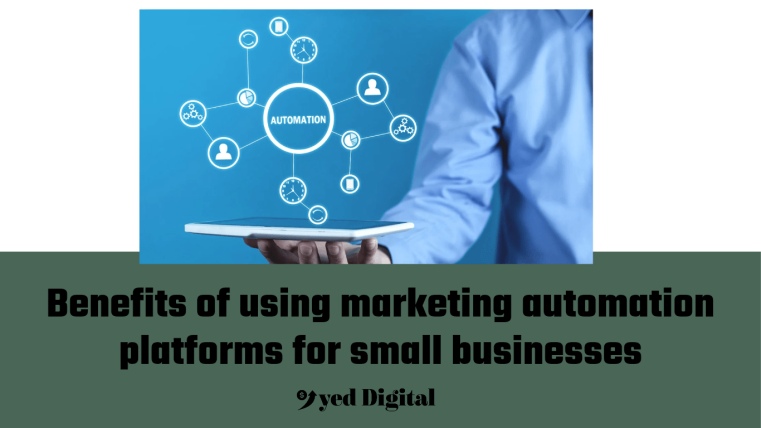
In the digital marketing world which keeps forever updating itself, SMEs are looking for ways to enhance their strategies and make processes more smooth and companies more efficient.
A solution that has gained a lot of prominence in recent years is marketing automation platforms.
These tools give a variety of advantages for small businesses who are willing to handle their marketing on their own.
1. Increased Efficiency and Time Savings
Marketing automation platforms allow small businesses to automate regular taks like email marketing, posting in social networks and lead nurturing.
While automation mechanizes these functions, the businesses can save time and resources, which can be used elsewhere for other important operations.
Automation allows to execute many functions that usually would have required manual interventions enabling the teams to work more strategically.
2. Improved Lead Generation and Management
The other main advantage of marketing automation is its capabilities to shorten the time frame of lead generation and nurturing.
These avenues serve as some of the main lead generation channels for businesses like website forms, social media, and landing pages.
When the leads are created, automation tools can take them through targeted email marketing campaigns, customized content, and lead ranking systems.
Similarly, businesses can do this through sending relevant and timely messages to prospects on their journey through the sales funnel and increase conversion rates.
3. Improved Customer Engagement and Retention
Proper communication is definitely the key to success in customer relations.
Marketing automation platforms are the driving force of small businesses in creating meaningful connections with their audience through multiple channels and also delivering at scale personalized experiences.
Automation is not only about sending an automated birthday email, recommending relevant products based on past purchases, or following up with customers after a sale, but also serving businesses in a very useful way of being kept top-of-mind and generating repeat business.
4. Data-Driven Decision Making
Data is the large vein of the modern marketing and marketing automation systems provide the small businesses with essential information on the audience, campaigns, and the overall performance.
These tools provide powerful analytics and reporting capabilities that help businesses observe the main metrics, chart the success of campaigns, and locate the areas for improvement.
Employing data-driven tools, companies can gain actionable insights, increase the efficiency of marketing campaigns, and deliver better outcomes.
5. Scalability and Development Potentials
With the development and expansion of small businesses, their marketing requirements are becoming increasingly more complicated.
Marketing automation platforms are crafted to grow together with businesses, being scalable and delivering the flexibility and functions necessary to support the company’s growth.
Whether managing bigger email lists, implementing more advanced automation workflows, social media campaigns or integrating with other tools and systems, automation platforms can meet the needs of a small business that keeps on growing.
6. Cost-Effectiveness
Actually, marketing automation is not something just for big enterprises who have abundant budgets for it.
For small business owners, the platforms for automation provide an affordable product line with price plans adjusted to a particular budget.
Through automation of repetitive tasks and optimizing processes, businesses can realize huge cost savings in the ongoing operations as well as exploiting their marketing ROI maximally.
Summary
Selecting the relevant marketing automation tool is very necessary for small businesses that plan to improve and stabilize their marketing efforts and growth. While the free options like HubSpot, Mailchimp, Zoho Campaigns, Sumo, or Benchmark Email can provide many of the necessary features, businesses will need to weigh their limitations and suitability for their specific circumstances.
Besides, trying trial plans of such platforms helps businesses to find out features before paying. Considering the key advantages of marketing automation (boosting efficiency, enhancing customer experience, and scaling operations) reveals its importance in the competitive environment.
By utilization of the right tools, small companies get an opportunity to optimize their marketing strategies and obtain efficient success with a marketing team.
